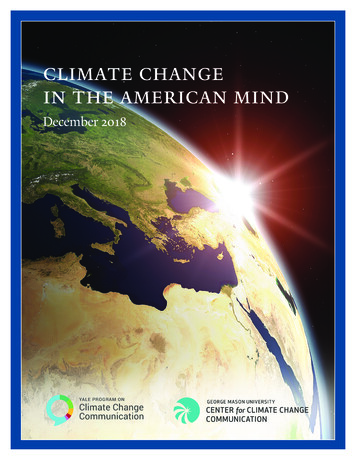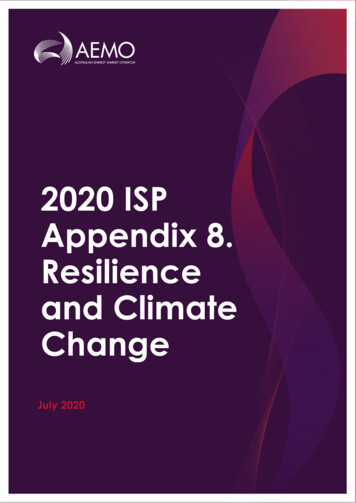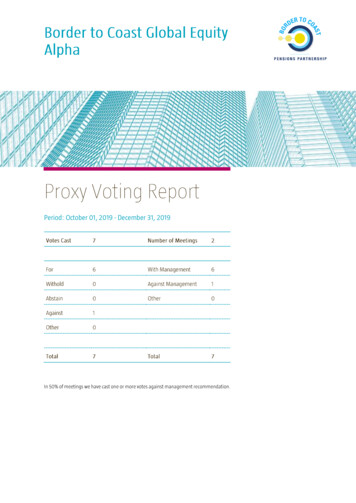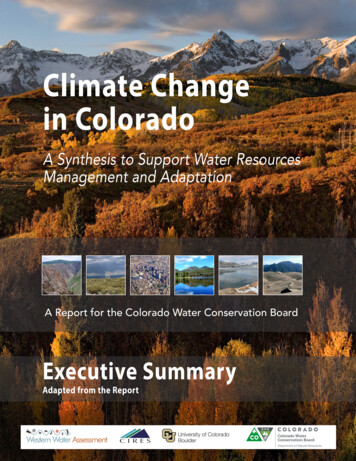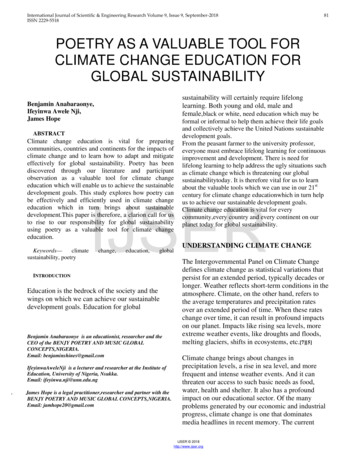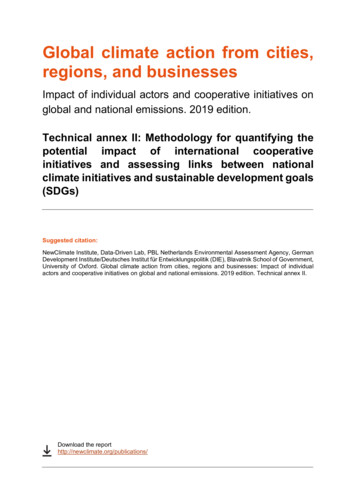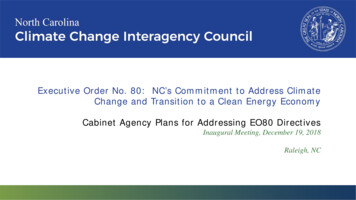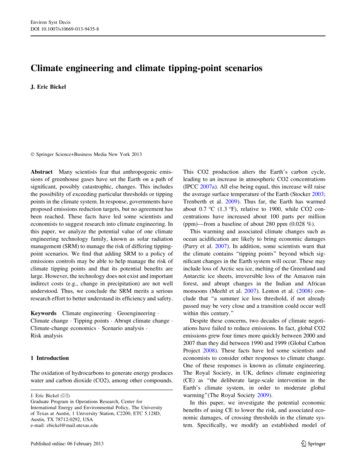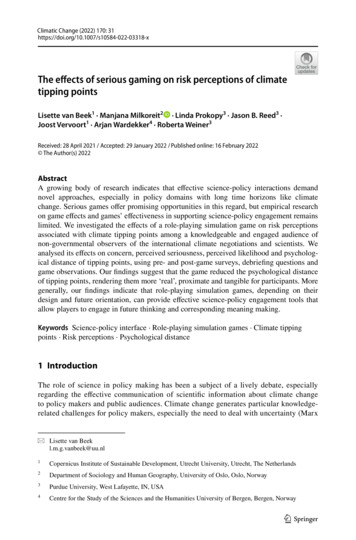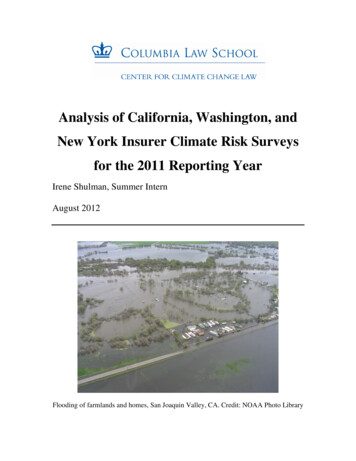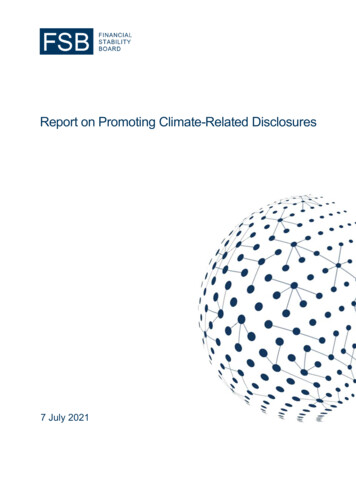
Transcription
Report on Promoting Climate-Related Disclosures7 July 2021
The Financial Stability Board (FSB) coordinates at the international level the work of nationalfinancial authorities and international standard-setting bodies in order to develop and promotethe implementation of effective regulatory, supervisory and other financial sector policies. Itsmandate is set out in the FSB Charter, which governs the policymaking and related activities ofthe FSB. These activities, including any decisions reached in their context, shall not be bindingor give rise to any legal rights or obligations.Contact the Financial Stability BoardSign up for e-mail alerts: www.fsb.org/emailalertFollow the FSB on Twitter: @FinStbBoardE-mail the FSB at: fsb@fsb.orgCopyright 2021 Financial Stability Board. Please refer to the terms and conditions
Table of ContentsExecutive summary . 11.Introduction . 42.Climate-related disclosure practices across jurisdictions . 53.4.5.2.1.Setting requirements, guidance and expectations on climate-related disclosuresfor financial institutions and non-financial corporates . 52.2.Implementation of TCFD Recommendations . 72.3.Approaches to implementation and compliance regimes. 112.4.Scope of climate-related disclosures . 142.5.Experiences and outcomes on climate-related disclosures and implementation . 172.6.Need for international coordination, cooperation and convergence . 21Useful examples of jurisdictions’ approaches to implementation . 233.1.Measures taken by jurisdictions, including tools used to require climate and TCFDdisclosures and tools used to support voluntary disclosures . 233.2.EMDE considerations for implementation. 33High level guidance to address implementation challenges . 344.1.Consistency of disclosures . 354.2.Reliability of disclosures . 39Conclusions and future work . 40iii
iv
Executive summaryGlobally consistent and comparable disclosures by firms of their climate-related financial risksare increasingly important to market participants and financial authorities as a means to giveinvestors and other market participants the information they need to manage risks, and seizeopportunities, stemming from climate change.In an environment with a proliferation of third-party frameworks for climate-related disclosures,the FSB calls for an acceleration of progress in the implementation of climate-relateddisclosures, using a framework based on the TCFD Recommendations 1, in line with jurisdictions’regulatory and legal requirements. This would be an important step forward on the path towardsconvergence with anticipated international reporting standards on climate, and help buildindustry-wide capabilities ahead of time. Global alignment of practices would help deliverconsistent and comparable disclosures and foster convergence. The FSB welcomes the IFRSFoundation’s programme of work to develop a baseline global sustainability reporting standardunder robust governance and public oversight, built from the TCFD framework and the work ofan alliance of sustainability standard-setters, involving them and a wider range of stakeholdersclosely, including national and regional authorities.The FSB surveyed its members in the first half of 2021 to explore national/regional practices(current or planned) of financial authorities on promoting climate-related disclosures. The surveyresponses indicate that:1 There is a strong focus across the majority of jurisdictions in implementing climaterelated disclosures, often with multiple authorities involved in each jurisdiction to coverthe breadth of disclosures across financial institutions and non-financial corporates. A large majority of jurisdictions set or plan to set requirements, guidance or expectationsfor both financial institutions and non-financial corporates. TCFD Recommendations are the common basis for climate-related disclosures in mostjurisdictions that set or plan to set requirements or guidance in this area. Other thirdparty frameworks and standards tend to be referenced in conjunction with TCFDRecommendations. The development of financial authorities’ approaches to climate disclosures is stillongoing in many jurisdictions. Approaches to implementation vary, both between andwithin jurisdictions. One primary difference in approaches is whether the regimes are‘mandatory’ or ‘voluntary’ in their implementation. The report includes case studies ofjurisdictions’ approaches on the UK, Japan, European Union, Hong Kong and Brazil. Jurisdictions range in practice on the materiality lens that they apply on climate-relateddisclosures. A few jurisdictions provide guidance based on materiality for climaterelated disclosures, under existing securities disclosure requirements for listed entities.The term “TCFD Recommendations” in this report refers to the Recommendations and Supporting Recommended Disclosuresset out in the June 2017 Recommendations of the Task Force on Climate-related Financial Disclosures.1
While the TCFD Recommendations were developed with a focus on climate-relatedfinancial disclosure, jurisdictions are increasingly looking beyond climate change toframeworks for disclosure on broader sustainability matters. While climate change is global in nature, the risks and opportunities and financial impactvary across jurisdictions. This poses unique considerations for EMDE jurisdictions, aswell as for firms in those jurisdictions, which should be recognized in order to bettersupport their efforts in implementing climate-related disclosures frameworks. Most jurisdictions expressed strong support for the development of a common globalbaseline of international reporting standards on climate, with many referencing theongoing work of the IFRS Foundation.Areas of gaps and challenges in the implementation of requirements or guidance based onTCFD Recommendations were identified, stemming from the findings above. These relate to i)the consistency of climate-related disclosures (including the use of TCFD Recommendations asthe basis for frameworks and for coordination across jurisdictions and within each jurisdiction)and ii) the reliability of climate-related disclosures (including the use of regulatory or supervisorymechanisms to drive progress and third-party verification).The report sets high-level guidance, in the form of recommendations, to support financialauthorities in their development of frameworks, as they consider appropriate to their wider publicpolicy objectives, regulatory and legal frameworks. While recognizing the need for jurisdictionalflexibility, it aims to promote greater consistency in approaches and accelerate progress. Inparticular: Recommendation 1 - Financial authorities are encouraged to use a framework basedon the TCFD Recommendations across all sectors (non-financial corporates andfinancial institutions) for climate-related financial disclosures, in line with jurisdictions’regulatory and legal requirements. This would foster a more consistent global approachand promote convergence in anticipation of international reporting standards on climatethat will build on the TCFD Recommendations. Recommendation 2 - Financial authorities are encouraged to promote sharing ofexperiences, provide mutual support across jurisdictions on implementation of climaterelated disclosure frameworks and accelerate international efforts to help build industrywide awareness, technical knowledge and capabilities. Recommendation 3 - Financial authorities within each jurisdiction are encouraged tostrongly coordinate in order to provide clear and consistent expectations, guidance orrequirements to firms across all sectors on climate-related disclosures. Recommendation 4 - As disclosure practices continue to evolve and improve over time,in the longer term financial authorities can contribute to significantly improving thereliability of climate-related disclosures if they were to require, as appropriate, someform of third-party verification or assurance on climate-related disclosures made byfirms. Where frameworks in jurisdictions require firms to provide climate-relateddisclosures within financial filings, financial authorities could set expectations on thelevel of assurance required on the disclosed information.2
Continued coordination among financial authorities at the jurisdiction level and globalcoordination across jurisdictions and with relevant organisations is paramount to support the callfor an acceleration in progress. The FSB can play an important role in global coordination,including promoting adoption of anticipated international reporting standards based on TCFDRecommendations, once developed and if endorsed, as a common global baseline. Suchinternationally agreed standards for disclosures as a global baseline would not precludeauthorities from going further or at a faster pace in their jurisdictions. Jurisdictions will have theirown regulatory and legal frameworks for adopting, applying or considering international reportingstandards.3
1.IntroductionThis report examines the current and planned climate-related disclosure practices across FSBmember jurisdictions and sets out high-level guidance to address implementation challenges.As part of its global coordinating role, the FSB undertook work in the first half of 2021 to explorenational/regional practices of financial authorities on promoting climate-related disclosures. Theobjective of this report is to promote high quality, consistent implementation of the Task Forceon Climate-related Financial Disclosures (TCFD) recommendations as the basis for climaterelated financial disclosures, in line with jurisdictions’ regulatory and legal frameworks, and tocontribute to a more common approach among national/regional financial authorities. Globalalignment of practices on climate-related disclosures would help deliver consistent andcomparable disclosures, foster convergence and guide practices to align with and prepare foranticipated international reporting standards on climate that will build on the TCFDRecommendations.The report draws on a survey conducted in March 2021 of FSB member jurisdictions on currentand planned approaches to promoting climate-related disclosures, including in requirements,guidance or expectations and implementation of TCFD Recommendations. All 25 FSB memberjurisdictions provided consolidated responses covering their respective financial authorities. 2The TCFD Recommendations set out a comprehensive framework that has been developed by,and is directly responsive to the needs of, users and preparers of financial filings across a rangeof financial and non-financial sectors around the world. The recommendations focus on decisionuseful information (such as to investors, lenders, insurance underwriters) and have attractedwidespread support. In an environment with a proliferation of third-party frameworks for climaterelated disclosures, the FSB has strongly encouraged national or regional authorities that aredeveloping requirements or guidance for climate-related disclosures to consider using the TCFDRecommendations as the basis. 3 Such consistency in approach would promote globalconvergence, both across jurisdictions, and between requirements and guidance beingdeveloped today and future international standards. Globally consistent and comparabledisclosures by non-financial corporates and financial firms of their climate-related financial risksare increasingly important to investors, other market participants and financial authorities as ameans to give financial market participants the information they need to manage risks, and seizeopportunities, stemming from climate change.This report aims to advance consistent implementation of TCFD Recommendations. The FSBcalls for an acceleration of progress in the implementation of climate-related disclosures, usinga framework based on the TCFD Recommendations, in line with jurisdictions’ regulatory andlegal requirements. This would be an important step forward on the path towards convergencein anticipation of international reporting standards on climate, and help build industry-widecapabilities ahead of time.23All 25 FSB member jurisdictions provided consolidated responses: Argentina, Australia, Brazil, Canada, China, European Union(EU), France, Germany, Hong Kong, India, Indonesia, Italy, Japan, Korea, Mexico, Netherlands, Russia, Saudi Arabia,Singapore, South Africa, Spain, Switzerland, Turkey, UK and US.FSB public statement FSB encourages the IFRS Foundation and authorities to use TCFD’s recommendation as a basis forclimate-related financial risk disclosures, 21 December 20204
The report is structured as follows. Section 2 describes the survey findings on the range ofclimate-disclosure practices across jurisdictions. Section 3 examines selected case studies thatprovide more detail on jurisdictions’ approaches to implementation and how the TCFDframework has been implemented. Section 4 identifies specific areas of challenge onimplementation of requirements or guidance based on TCFD Recommendations and sets outhigh-level guidance to address these implementation challenges. Section 5 concludes andidentifies important future work for the FSB as part of its global coordinating role.2.Climate-related disclosure practices across jurisdictionsThis section sets out the survey findings of the range of climate-disclosure practices acrossjurisdictions. It presents a snapshot in time of the range of approaches taken across jurisdictions,including those of advanced economies (AEs) and emerging markets and developing economies(EMDEs), and the stages they are at with respect to setting requirements, guidance orexpectations on climate-related disclosures. Where possible, it identifies similarities anddifferences in approaches across and within jurisdictions, including the supervisory andregulatory tools available, the approaches taken to using TCFD Recommendations as the basis,and implementation challenges based on current practices.2.1.Setting requirements, guidance and expectations on climate-relateddisclosures for financial institutions and non-financial corporates2.1.1.Mandates of financial authoritiesThe survey responses indicate that there is a strong focus across the majority of jurisdictions inimplementing climate-related disclosures, often with multiple authorities involved in eachjurisdiction to cover the breadth of disclosures across financial institutions and non-financialcorporates. All 25 jurisdictions 4 have one or more authorities that consider climate-relateddisclosures within their existing mandates, taking on various perspectives including, in mostcases, on risks and opportunities associated with Environment, Social, Corporate Governance(ESG), followed by the interests of depositors (and, in some cases, policyholders), investorprotection, transparency, wider societal impacts associated with ESG and, in fewer cases,financial stability, fair and efficient markets, as well as accelerating the development ofsustainable finance.2.1.2.Differences in stages of implementation across jurisdictionsA large majority of jurisdictions set or plan to set requirements, guidance or expectations onclimate-related disclosures for both financial institutions and non-financial corporates. Morespecifically, 14 out of 25 jurisdictions indicate that they currently have requirements, guidanceor expectations in place in respect of climate-related disclosures. 5 These approaches generally4525 jurisdictions responded in the survey to have one or more authorities that consider climate-related disclosures within theirexisting mandates and another jurisdiction mentioned it considered climate risk more broadly in its authorities’ mandates.Australia, EU, France, Germany, Hong Kong, Indonesia, India, Italy, Japan, Netherlands, Singapore, Spain, Turkey and UK.5
cover areas such as disclosure for listed entities, disclosures for financial institutions, andinvestors’ protection. Nine jurisdictions are planning to introduce requirements, guidance orexpectations, with planned approaches mostly focusing on assessing financial institutions’climate-related risks and improving transparency. 6 Two jurisdictions indicated no plans yet. 7 Seegraph 1 below.Please indicate whether your jurisdiction already has requirements, guidance orexpectations in respect of climate-related disclosures currently in place, whetherit is planning to introduce such requirements or whether it has no plans yet.Graph 1Source: FSB QuestionnaireAlmost all jurisdictions set or plan to set requirements, guidance or expectations for both nonfinancial corporates and financial institutions. More specifically, 21 jurisdictions focus on both,while three jurisdictions focus only on financial institutions (see graph 2 below). 8678Argentina, Brazil, Canada, China, Korea, Mexico, Russia, Switzerland and US. For the insurance sector in the US, an annualNAIC Climate Risk Disclosure Survey has been administered since 2010 to insurers representing over 70% of US direct writtenpremium, on information such as how they incorporate climate risks into their mitigation, risk management, investment andbusiness plans. Beginning in 2020, insurers were allowed to submit a TCFD report in lieu of the NAIC Climate Risk DisclosureSurvey.Saudi Arabia and South Africa.Out of the two jurisdictions (Saudi Arabia and South Africa) that stated they had no plans yet for setting requirements, guidanceor expectations in respect of climate-related disclosures (Graph 1), South Africa is exploring the possibility of developingdisclosure requirements for financial institutions. This accounts for the difference between Graphs 1 and 2 in the number ofjurisdictions with no plans yet.6
Do financial authorities or other official sector entities within your jurisdictioncurrently set, or plan to set, requirements, guidance or expectations on climaterelated disclosures for non-financial corporates and financial institutionsGraph 2Source: FSB QuestionnaireFor corporate disclosures, 12 jurisdictions have or plan to have approaches for both publiclylisted and non-listed corporates, nine focus only on publicly listed corporates and the remainingfour have no plans yet.For financial institutions’ disclosures, current or planned approaches in 22 jurisdictions coverboth publicly listed and non-listed financial institutions. Only two jurisdictions planned to focusonly on publicly listed financial institutions and one jurisdiction had no plans yet. Financialinstitutions in scope of climate-related disclosures tend to be mostly banks, insurers and assetmanagers, and in a fewer cases pension funds and financial advisers.Overall, based on survey responses, it appears that most AEs have reached the stage of havingrequirements, guidance or expectations in place, while most EMDEs are at the planning stage.Only two jurisdictions have no plans yet (reflected in graph 1).Jurisdictions’ main motivations for setting requirements, guidance or expectations on climaterelated disclosures cover a wide span – the motivations relate to assessing climate-related riskfor financial institutions, developing sustainable finance markets, assessing opportunities forfinancial institutions, and investor protection. In addition, improving resilience of market playersand of the financial sector were also mentioned as motivations among some jurisdictions.2.2.Implementation of TCFD Recommendations2.2.1.TCFD Recommendations as the common basis for climate-related financialdisclosure frameworksAmong the 23 jurisdictions who set or plan to set requirements, guidance or expectations onclimate-related financial disclosures, TCFD Recommendations are the common basis in mostcases. More specifically, 18 out of 23 jurisdictions have adopted or are planning to adopt7
frameworks aligned with the TCFD Recommendations 9, with 15 of these setting disclosurerequirements or expectations against all of TCFD’s four overarching recommendations and 11recommended disclosures 10.Most jurisdictions that have used the TCFD recommendations as the basis for their climaterelated disclosures have directly referenced the recommendations within the relevant legal orregulatory text. Those jurisdictions that are still developing their approach to climate-relateddisclosures (such as Mexico, Hong Kong or Switzerland) are similarly considering referencingthe TCFD Recommendations.A few jurisdictions have taken or intend to take slightly different approaches in their requirementsby not referencing the TCFD Recommendations directly. In one case (Brazil), the TCFDRecommendations provide inspiration for the design of the regime but only prudential aspectsof TCFD Recommendations applicable to financial institutions will be implemented. In othercases, TCFD Recommendations have been referenced in relevant accompanying guidancematerials and frameworks align with TCFD Recommendations (EU and its member states –France, Germany, Italy, Netherlands and Spain). The survey identified a number ofimplementation challenges: Readiness and capabilities across all TCFD Recommendations. In general, responsesto the survey revealed that companies were generally better prepared to meet therecommended disclosures under the ‘governance’ and ‘risk management’ coreelements of the TCFD Recommendations, where the nature of the expectations wasgenerally familiar and well understood by reporting companies. However, some aspectsof the ‘strategy’ and ‘metrics and targets’ core elements were less familiar, most notablythe recommended disclosure on using scenario analysis to assess the resilience of theorganisation’s climate strategy (Strategy (c)). Observations in the 2020 TCFD StatusReport support this view.11 The Report notes the coverage and quality of disclosurevaries considerably across the 11 Recommended Disclosures, as well as acrossregions and sectors. Some jurisdictions have taken account of this issue byimplementing the requirements on a ‘comply or explain’ basis. Compatibility with existing requirements. Some jurisdictions had implemented climaterelated disclosure requirements ahead of the finalisation of the TCFDRecommendations and were not inclined to revise their regimes. They stated that, forinstance, the principles-based nature of the TCFD Recommendations could lead to lessspecificity and granularity in requirements than existing regimes. In some instances,non-mandatory guidelines on reporting climate-related information have been publishedex post to provide clarity to the market, including references to TCFDRecommendations.918 jurisdictions reported that their relevant financial authorities use TCFD Recommendations as the basis for their current orplanned requirements, guidance or expectations (Australia, Brazil, Canada, China, EU, France, Germany, Hong Kong, Italy,Japan, Korea, Mexico, Netherlands, Russia, Singapore, Spain, Switzerland and UK); six reported they don’t use TCFD as abasis (Argentina, Indonesia, India, South Africa, Turkey and US); and one did not provide an answer (Saudi Arabia).10See TCFD (2017), Recommendations of the Task Force on Climate-related Financial Disclosures, which sets out four coreelements of recommended climate-related disclosures – governance, strategy, risk management, and metrics and targets. TheTCFD’s four overarching recommendations are supported by 11 recommended disclosures.11TCFD (2020), 2020 Status Report8
Granularity of references to the TCFD Recommendations. A final consideration inimplementing the TCFD Recommendations is the level of detail in which they areimplemented (see section 2.3 on different approaches for more detail). While referencesto the four overarching recommendations and 11 Recommended Disclosures arecommonly used in jurisdictions’ frameworks, the additional supporting documentationprepared by the TCFD seems to be referenced less frequently. Only nine of 25respondents stated that their approach directly references both the TCFDRecommendations and accompanying all-sector or supplementary guidance, or thatTCFD Recommendations have been transposed and/or adapted. This could haveimplications for the consistency and quality of disclosures by in-scope companies dueto differences in interpretation of the recommendations.Given the strong international support and growing adoption of the TCFD Recommendations –across both industry and the official sector – many climate-related and sustainability-relateddisclosure initiatives have adapted to their form and structure. This has been seen most recentlywith the IFRS Foundation initiative, which proposes to establish the International SustainabilityStandards Board (ISSB). The IFRS Foundation Trustees have clarified that they intend todevelop an initial ‘climate first’ reporting standard by building on existing frameworks. TCFD isrepresented in the IFRS Foundation’s Technical Readiness Working Group (TWG), among otherstandard-setting organisations.This report looks at how the TCFD Recommendations interact with other frameworks in section2.3 as well as international coordination in section 2.6.2.2.2.Interaction between TCFD framework and other frameworksA vast majority of jurisdictions reference or intend to reference TCFD Recommendations inregulations, guidance or expectations. Other frameworks are or will be referenced as well. Inaddition to the high-level TCFD Recommendations, there are five main third-party standards andframeworks for climate-related disclosures, namely the Global Reporting Initiative (GRI),Sustainability Accounting Standards Board (SASB), International Integrated Reporting Council(IIRC) 12, Climate Disclosure Standards Board (CDSB) and Carbon Disclosure Project (CDP).The first three are comprehensive, covering the broader ESG spectrum, the first two includingsector-specific standards, recommendations and metrics. At a high level,12 The GRI Standards help organizations understand and disclose their sustainabilityimpacts on the economy, environment, and society in a consistent and credible waythat meets the needs of multiple stakeholders. The SASB Standards offer a practical tool for companies looking to implement theTCFD Recommendations and help firms communicate to investors how sustainabilityissues drive long-term enterprise value.Value Reporting Foundation (2021), IIRC and SASB form the Value Reporting Foundation, providing comprehensive suite oftools to assess, manage and communicate value (9 June)9
The integrated reporting process, defined by the IIRC, brings together materialinformation about an organisation’s ability to create value over time in a way that reflectsthe commercial, social and environmental context within which it operates.The other two frameworks are more narrowly focused on the environment: The CDSB Framework sets out an approach to reporting environmental information inmainstream reports, with the objective of aligning with and complementing financialreporting and encouraging the standardisation of environmental information. CDP is a global disclosure reporting system on environmental impacts, which aims toincentivise and guide companies and cities on their efforts to reduce their greenhousegas emissions, safeguard water resources and protect forests.All five standards and frameworks have their own particular emphasis. Responses indicate that,where these third-party frameworks are used, it is typically done in conjunction with TCFDRecommendations rather than as an alternative. More specifically, out of 22 jurisdictions whostated their relevant financial authorities reference or will reference TCFD, 13 20 reference otherthird-party frameworks alongside TCFD, while for the other two jurisdictions, TCFD is the onlypreferred reporting framework. 14 In some cases, jurisdictions are also referencing otherframeworks or guidance than the ones listed above, such as domestic guidance. 15While the third-party frameworks share some common or complementary elements, they arenonetheless distinct, each with its own scope, target audience and metrics. The application byfirms of the voluntary frameworks over time has contributed to divergences in disclosurepractices, making it difficult for users to compare the information disclosed, thus reducing itsusefulness and potentially hindering decision-making. Firms are also challenged by the reportingburden as they navigate the different voluntary frameworks and options to choose from fordisclosure. Further, companies that operate across borders are likely to face disparities indisclosure requirements between jurisdictions, as well as differing demands for information frominvestors and data providers.Recognising the complexity around the current sustainability disclosure landscape and theurgent need for a comprehensive sustainability corporate reporting framework, these fiveorganisations (“the alliance”) published a statement in September 2020 setting out a sharedvision with the intent to complement each other and build on TCFD Recommendations 16.Subsequently, the alliance published a prototype climate-related financial disclosure standardthat can provide a
Jurisdictions range in practice on the materiality lens that they apply on climate-related disclosures. A few jurisdictions provide guidance materiality for climate- based on related disclosures, under existing securities disclosure requirements for listed entities . 1
